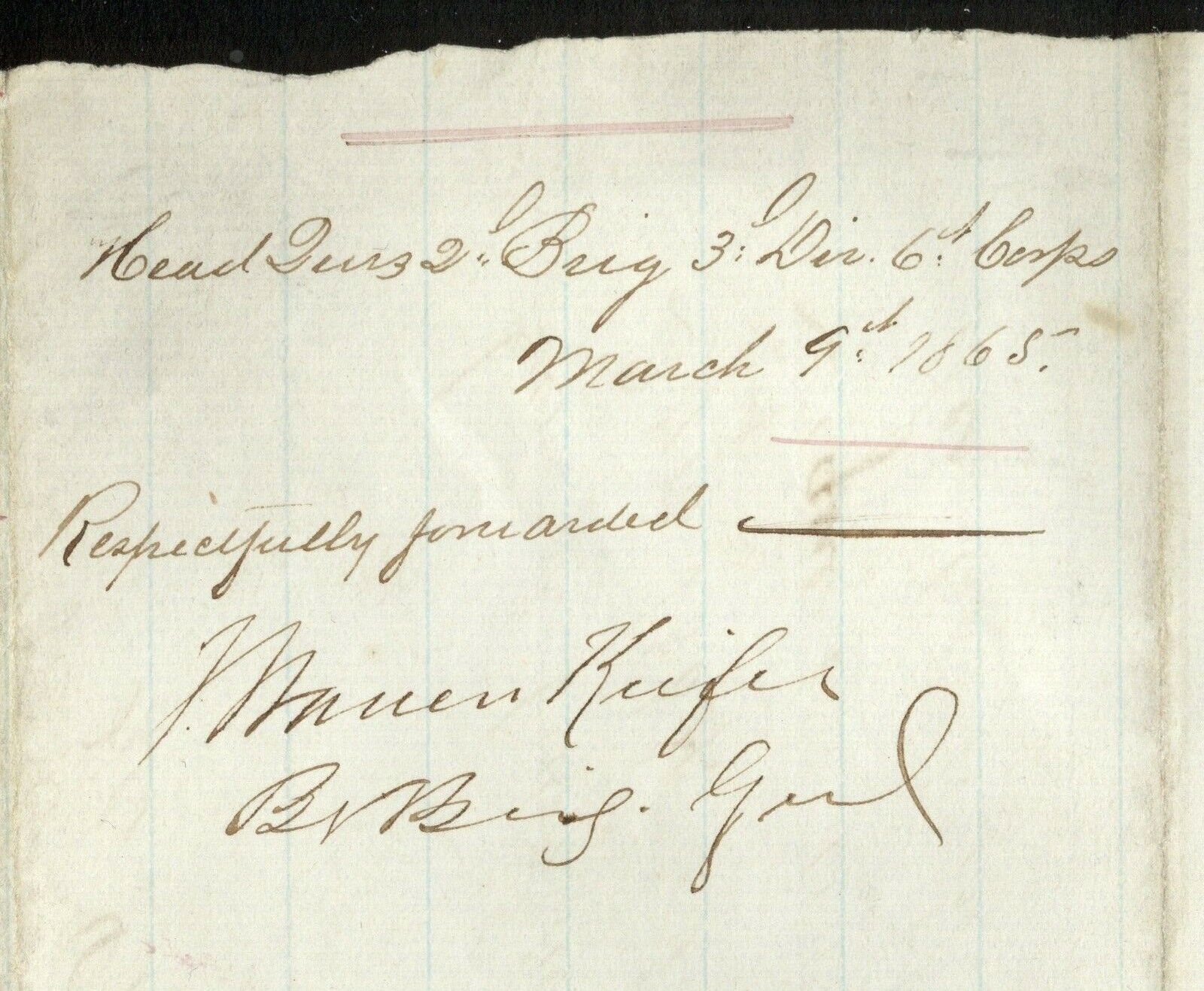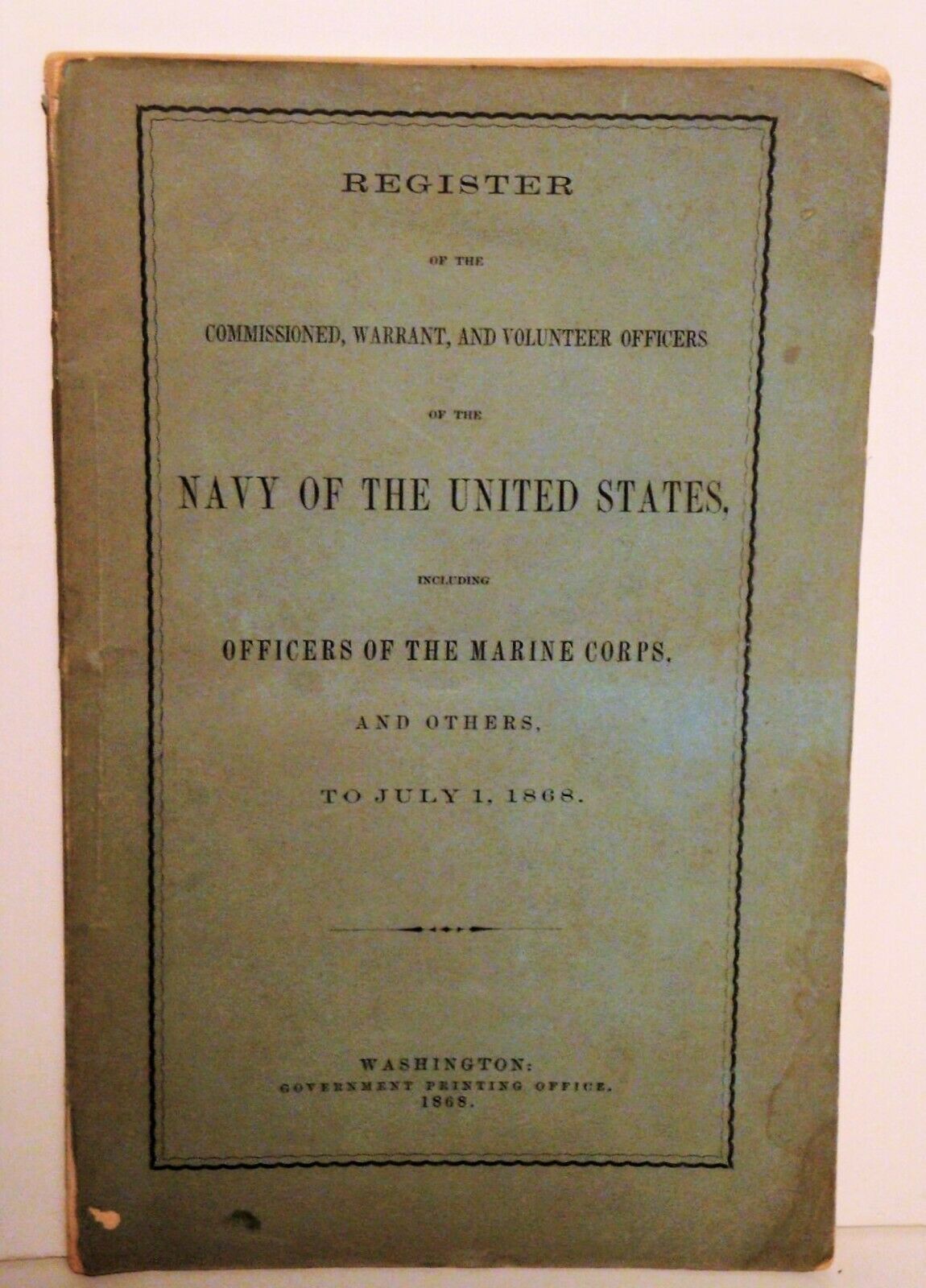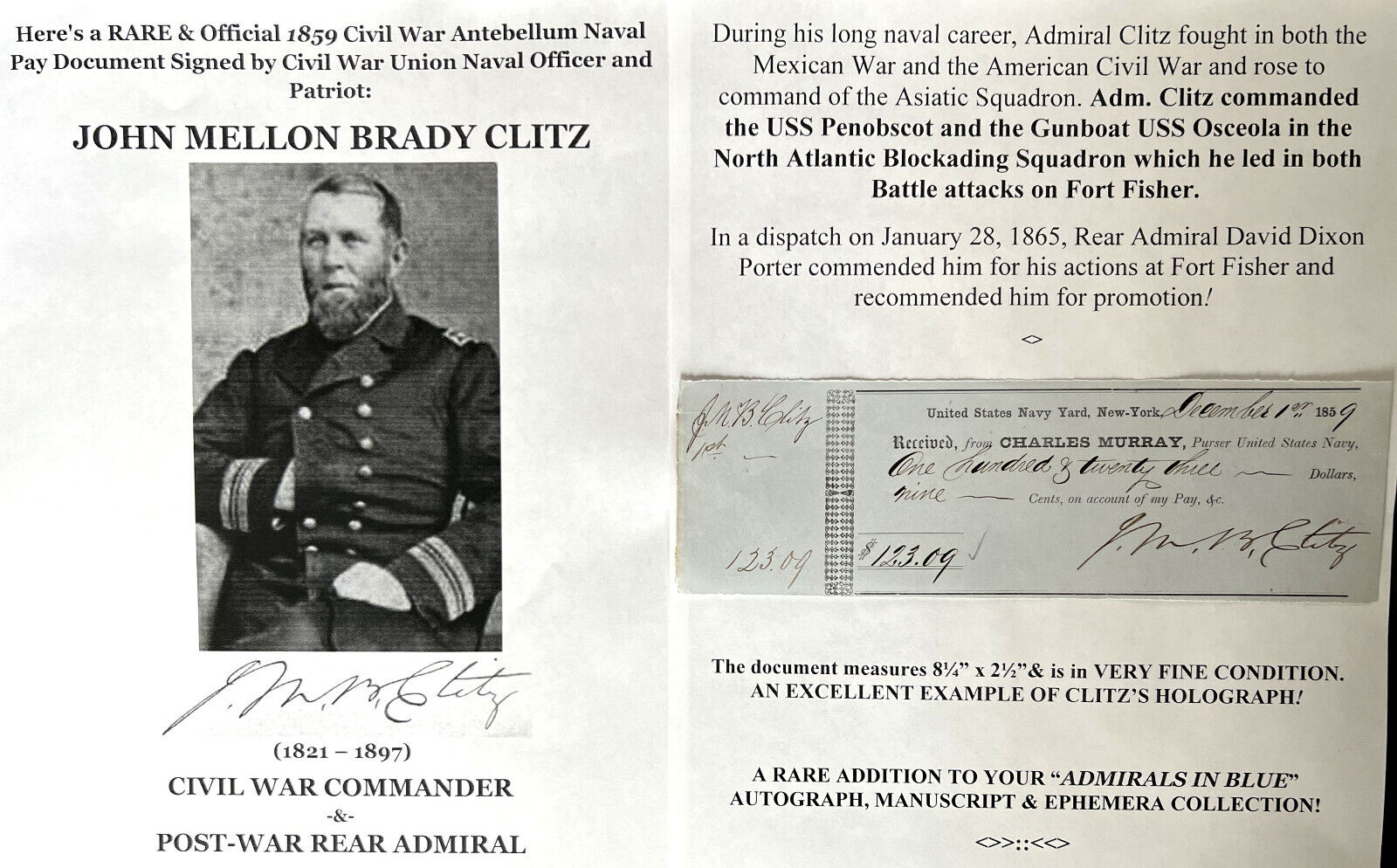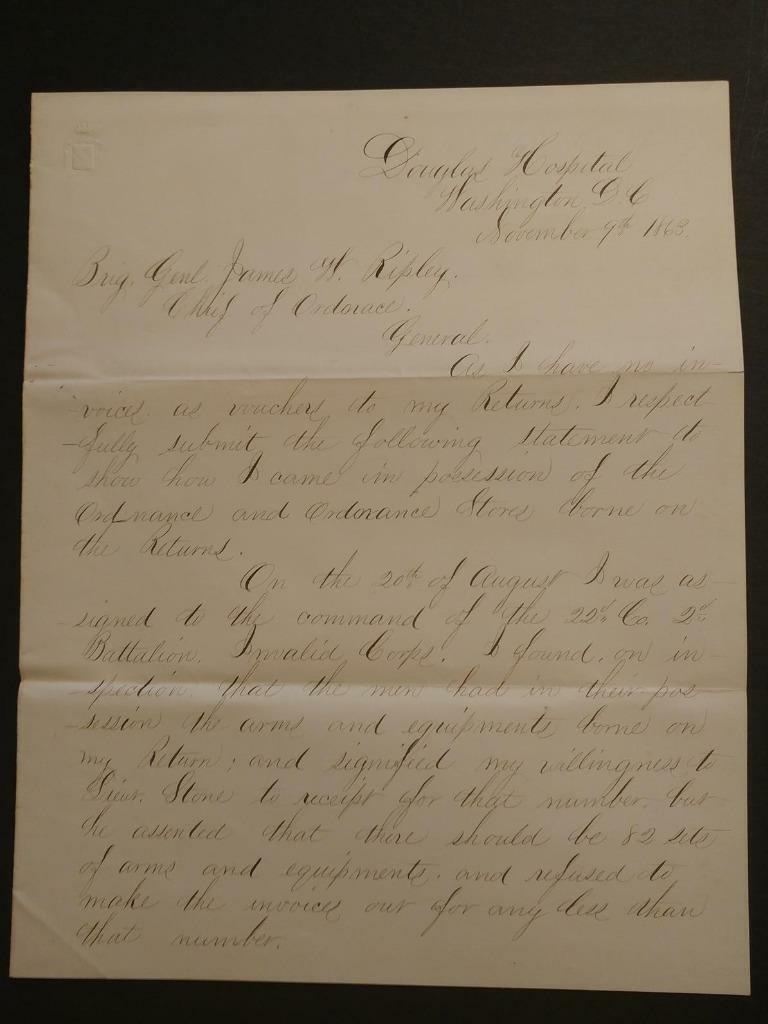-40%
1865 Manuscript Document re: Deserted Soldier – Signed by General J. W. Keifer
$ 155.76
- Description
- Size Guide
Description
1865 Manuscript Document re: Deserted Soldier –Signed by General J. W. Keifer
Offered for your consideration is a manuscript document reporting the desertion of an individual from the Union Army, signed on the verso by Brevet Brigadier General Joseph Warren Keifer. Penned from “
Hd. Qrs. 67
th
Regt. Penna. Vols.
/
2
nd
Brig. 3
rd
Div. 6 A.C.
” on “
March 9
th
1865
”, this document is addressed to “
Capt. A. J. Smith
/
Actg. Asst. Adjt. Genl.
/
3
rd
Div. 6
th
A.C.
”. The body of the document states that “
In compliance in the General Order No 43 Hd. Qrs. 3
rd
Div. 6
th
A.C. dated Dec. 24
th
1864, I have the honor to report that Edward Logue an unassigned recruit of the 67
th
Regt. Pa. Vols. deserted to the enemy this morning while on picket.
”. It is signed “
Your Obdt. Servt.
/
Wm. G. Williams
” in his capacity as “
Major, 126
th
O. V. I.
/
Comdg 67
th
Pa. Vols.
”. The verso bears the expected filing information, including the unit involved, the name of the commanding officer, and a synopsis of the contents (this information would have been on the outside when the document was filed). A second section indicates that the document was also sent to “
Head Qurs 2
nd
Brig. 3
rd
Div. 6
th
Corps
/
March 9
th
1865
” and was “
Respectfully forwarded _______
”. This section is signed at the conclusion by “
J Warren Keifer
”, at the time a “
Bt Brig Genl
” (Brevet Brigadier General). The document is accomplished in period ink on light blue-lined white paper, apparently torn from some type of ledger (the left edge is very ragged). An interesting document regarding a Union soldier who deserted only one month before the surrender of Confederate General Robert E. Lee’s Army of Northern Virginia (one wonders why he would desert when the Union forces were in such a strong position at that particular time - the result of getting caught was generally not pleasant). Further research may uncover the subsequent lives of the lesser parties mentioned on this document.
Edward Logue
enlisted as a private on December 29, 1864, and was mustered in as a substitute into Company G, 67
th
Pennsylvania Volunteer Infantry the same day. He is listed in the records as deserting on March 9, 1865 (as noted in the presently offered document).
William G. Williams
was 23 years old (he was born in London, England in 1838) when he enlisted on October 11, 1862 as a 2
nd
lieutenant, and was mustered into Company K, 126
th
Ohio Volunteer Infantry the same day. He was promoted to 1
st
lieutenant on January 18, 1863, captain on July 25, 1864, and major on December 14, that same year. He was apparently wounded at Opequan, Virginia, on September 19, 1864. He was mustered out of the service at Washington, D.C. on June 25, 1865. William G. Williams died on November 11, 1922 in Oxford, Ohio and was subsequently buried in Spring Grove Cemetery in Cincinnati, Ohio.
Joseph Warren Keifer
was born in Bethel Township, Clark County, Ohio on January 30, 1836. He attended Antioch College before returning to his family farm, and in his spare time began studying law. He opened a law practice in Springfield, Ohio on January 12, 1858. He enlisted and was commissioned as a major in the 3
rd
Ohio Volunteer Infantry (3 Months) on April 27, 1861, being mustered out on June 12, 1861. He was immediately commissioned with the same rank into the 3
rd
Ohio Volunteer Infantry (3 Years), seeing action at the battles of Rich Mountain and Cheat Mountain. He was promoted to lieutenant colonel on February 12, 1862, and was discharged for promotion to colonel of the 110
th
Ohio Volunteer Infantry on September 30, 1862. He led his regiment at the second battle of Winchester, being wounded twice. He and his regiment missed the battle of Gettysburg, though they were present at the battle of Wapping Heights and assisted in the suppression of the New York draft riots. He was severely wounded in the arm on May 5, 1864 during the battle of the Wilderness at the opening of the Overland Campaign. When he returned to duty, Keifer was placed in command of the 2
nd
Brigade, 3
rd
Division, 6
th
Army Corps, which he led bravely at the battles of Winchester and Fisher’s Hill in the Shenandoah Valley. On December 12, 1864, President Lincoln nominated Keifer for appointment as brevet brigadier general of volunteers to rank from October 19, 1864, duly confirmed on February 14, 1865. With the return of the 6
th
Corps to the Army of the Potomac, Keifer participated in the Petersburg and Appomattox campaigns, for which he was brevetted to the rank of major general of volunteers on April 9, 1865. Following the war, Keifer returned to Springfield, Ohio and resumed his law practice. In 1873, he became a trustee of Antioch College, serving in that capacity until his death. He served in the United States House of Representatives from March 4, 1877 through March 3, 1885. Keifer returned to the military during the Spanish-American War when President William McKinley appointed him a major general of volunteers on June 9, 1898. He commanded the 7
th
Army Corps and was present when the United States forces marched into Havana, Cuba. After the war, he served as the first commander in chief of the United Spanish War Veterans from 1900 to 1901, and as Ohio commander of the Loyal Legion in 1903 and 1904. He was returned to the United States House of Representatives, serving from March 4, 1905 through March 3, 1911. Following this, Keifer again returned to the practice of law and served as the president of the Lagonda National Bank. Joseph Warren Keifer died on April 22, 1932 in Springfield, Ohio, and was buried in that city’s Ferncliff Cemetery.
The presently offered document exhibits signs of expected period use, followed by numerous years of less than ideal storage. Toning is noted across the entire surface, imparting an off-white to beige hue to the paper. This toning is significantly more pronounced at the edges and along the storage folds, particularly on the mostly blank back. Moderate soiling can be seen on the top half of the back, corresponding to the sections which would have been the outside of the document when it was folded for storage. Numerous folds and creases are present, with the three horizontal storage folds somewhat adversely affecting the integrity of the paper (small separations can be found at the edges – easily strengthened with archival tape). The contrast is average for the period, with all text and signatures fully legible. As noted earlier, it appears that this sheet was torn from a book or ledger, with the left edge being quite ragged (no text damaged). The remaining three edges exhibit signs of use, with some irregularities due to that use. Minor ink corrosion is mentioned for accuracy, as no paper has been lost or seriously affected. Measuring approximately 7¾ x 10⅜ inches, this piece would make a great addition to any Civil War generals or general Civil War collection.
A .95 charge will be added to the winning bid for postage and insurance.
A .00 charge will be added to any item picked up in person at our physical location.
If you have any questions regarding this item, please ask before purchasing.
Buy or Bid with Confidence – American Coins & Collectibles President Richie Self has worked 6 years as a paper money grader/authenticator. He has contributed to numerous reference books within the industry, as well as being a co-author of “The Comprehensive Catalog and History of Confederate Bonds, 2
nd
Edition” with Douglas B. Ball, Ph.D., Henry F. Simmons, M.D., Ph.D. and James R. Desabaye. Mr. Self is a life member of the American Numismatic Association, the Society of Paper Money Collectors, as well as numerous regional numismatic associations. He is an authorized submitter to NGC, PCGS, and PMG, a diamond founding member of Coin Dealers Helping Coin Dealers and a supporter of the Industry Council for Tangible Assets. American Coins and Collectibles can be found at many of the state and local coin shows.
American Coins and Collectibles
Shreveport, LA












